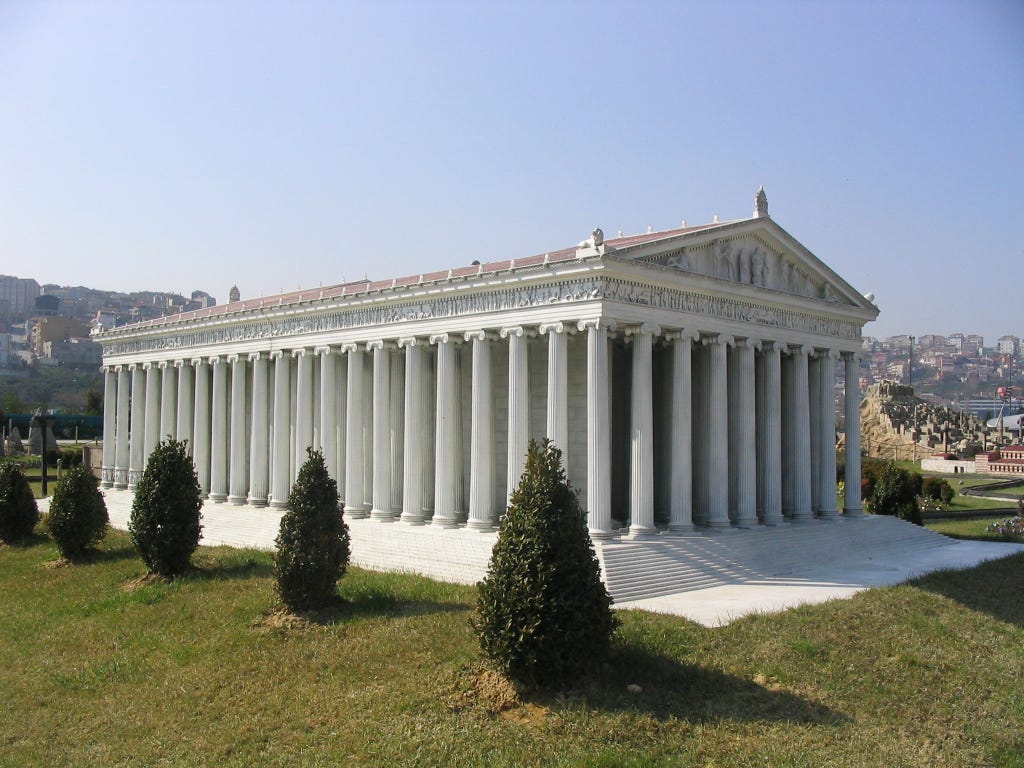It was in India that Alexander, a world conqueror who commanded the most fiercest, bravest and largest army, met the only man on earth he couldn’t conquer - a Hindu Yogi.
Alexander, born on the day when one of the ancient world’s seven wonder - Temple of Artemis was burnt down, succeeded his father Philip II to the throne at the age of 20.
Plutarch, greek philosopher, remarked that Artemis was too preoccupied with Alexander's delivery to save her burning temple.
Alexander spent most of his ruling years on an unprecedented military campaign and by the age of thirty, he had created one of the largest empires of the ancient world, stretching from Greece to northwestern India.
He was undefeated in battle, until he found his matches on the Northwestern region of Indus Valley - a brave King named Porus and a naked Yogi, who both, although for different reasons, defied and frustrated Alexander.
Greek historians traveling with the feisty commander brought back a record of what they encountered:
In the woods, lying on a bed of leaves, Greek soldiers stumbled across a Brahmin sage named Dandamis.
Alexander was intensely curious about the fabled wisdom of the Holy men of India.
He sent Dandamis a message:
“Alexander, Son of God and Lord of the Earth, invites you into his presence. If you come, you will be richly rewarded. If you don’t you will die.”
Dandamis was not impressed.
“There is only one King”, he answered,”The one who created light and life. He’s the only King I obey, and He abhors war.”
Dandamis continued:
How can this Alexander be the King of Earth as long as he remains subject to the King of Death ?
And what can he offer me when my mother the Earth already supplies and provides everything I need ?
I have no possessions I need to protect, so I sleep peacefully at night. Alexander may kill my body, but he can’t touch my soul.
Tell Your King that at the time of death each one of us will be asked to account for our actions in this life.
Ask him how he’s going to explain the agony of all those he has so painfully murdered and oppressed.
Your King can tempt those who crave gold. He can terrify those who fear death.
But we Brahmins care for neither.
Go tell Alexander he has nothing I want and that I cannot see him.
When Alexander’s men brought back the sages reply, and he heard Dandamis’s answer, he admitted that he, the conquer of the great world, had been
conquered by a naked old man.
Alexander requested Dandamis to accompany him, to be his guide, teacher, and friend. Dandamis rejected the request but suggested Alexander to instead take his disciple Kalyan (or Calanus as Greek pronounced his name), a philosopher from Taxila, with him to Macedonia.
After a long march over the desert to Persia and enduring frequently changing climatic conditions from Indus Valley to Persia, septuagenarian Kalyan’s health deteriorated.
Kalyan’s old body was able to survive the desert march of Makran when men half his age dies of exhaustion, but his health was irreparably damaged.
Soon, he informed and persuaded Alexander that he would prefer to die rather than live as an invalid. He decided to take his life by self-immolation. The year was 323 BC. Although Alexander tried to dissuade him from this course of action, upon Kalyan’s' insistence the job of building a pyre was entrusted to his close general Ptolmey.
Kalyan distributed all the costly gifts he got from the king to the people and wore just a garland of flowers and chanted vedic hymns. He presented his horse to one of his Greek pupils named Lysimachus. As he was going to the pile of the wood, he greeted and kissed the hands and bid farewell to his entourage but he would not kiss Alexander’s hand.
Instead, his last words to Alexander were:
We shall meet in Babylon
He did not flinch as he burnt to the astonishment of those who watched.
Alexander did not witnessed the death but instead chose to receive the news of the death.
With those words, Kalyan thus had prophesied the death of Alexander in Babylon, even though at the time of death of Kalyan, Alexander did not have any plans to go to Babylon.
Alexander died exactly a year later in Babylon, with no real cause attributed to his death with certainty.
============================================
Sources:
https://historicalleys.blogspot.com/2009/02/calanus-and-alexander.html
http://www.bhagavatam-katha.com/story-about-king-alexander-the-great-alexander-of-macedonia-had-been-conquered-by-a-naked-old-man/
https://isha.sadhguru.org/in/en/wisdom/article/alexander-met-diogenes
https://en.wikipedia.org/wiki/Death_of_Alexander_the_Great
https://en.wikipedia.org/wiki/Dandamis





